The Role of Ethics in Corporate Strategy and Social Responsibility
VerifiedAdded on 2022/11/29
|21
|5575
|123
Report
AI Summary
This research report delves into the critical role of ethics in corporate strategy, specifically examining how ethical practices impact a company's competitive environment and its commitment to social responsibility. The study begins with an introduction highlighting the increasing concern over moral decay in business and the need for corporations to prioritize ethical strategies. It uses the Google case study to illustrate the consequences of unethical behavior. The report then reviews existing literature, exploring the relationship between business ethics and competitive advantage, as well as social responsibility and competitive advantage. It proposes a conceptual framework to determine the relationship between ethics and corporate strategy, followed by a discussion of methodology, including the use of secondary data. The analysis explores how business ethics can improve the competitive environment and enhance corporate social responsibility. The report concludes by summarizing key findings, highlighting the importance of ethical practices for long-term success, and emphasizing the need for companies to consider the impact of their actions on both their competitive position and the well-being of society.
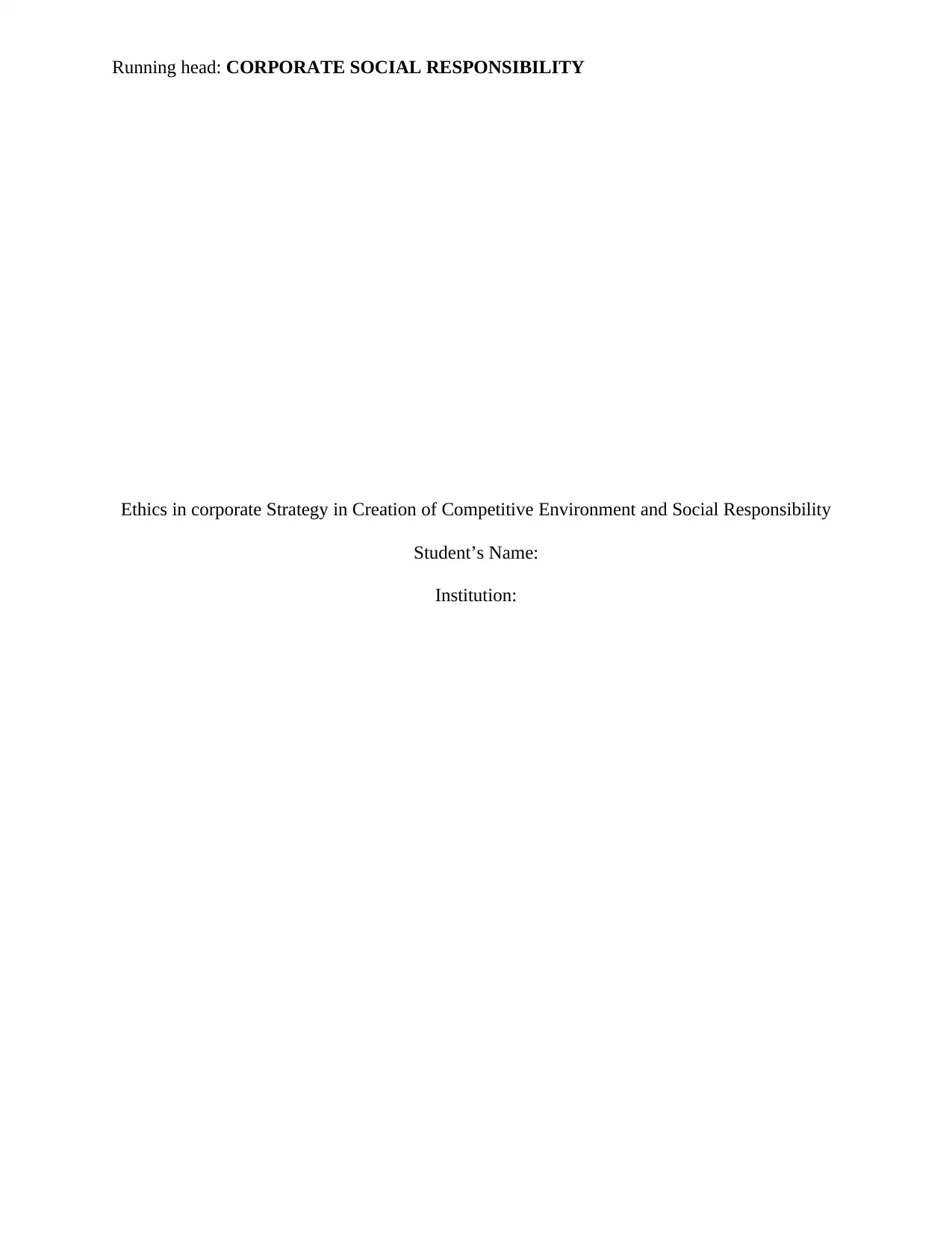
Running head: CORPORATE SOCIAL RESPONSIBILITY
Ethics in corporate Strategy in Creation of Competitive Environment and Social Responsibility
Student’s Name:
Institution:
Ethics in corporate Strategy in Creation of Competitive Environment and Social Responsibility
Student’s Name:
Institution:
Paraphrase This Document
Need a fresh take? Get an instant paraphrase of this document with our AI Paraphraser
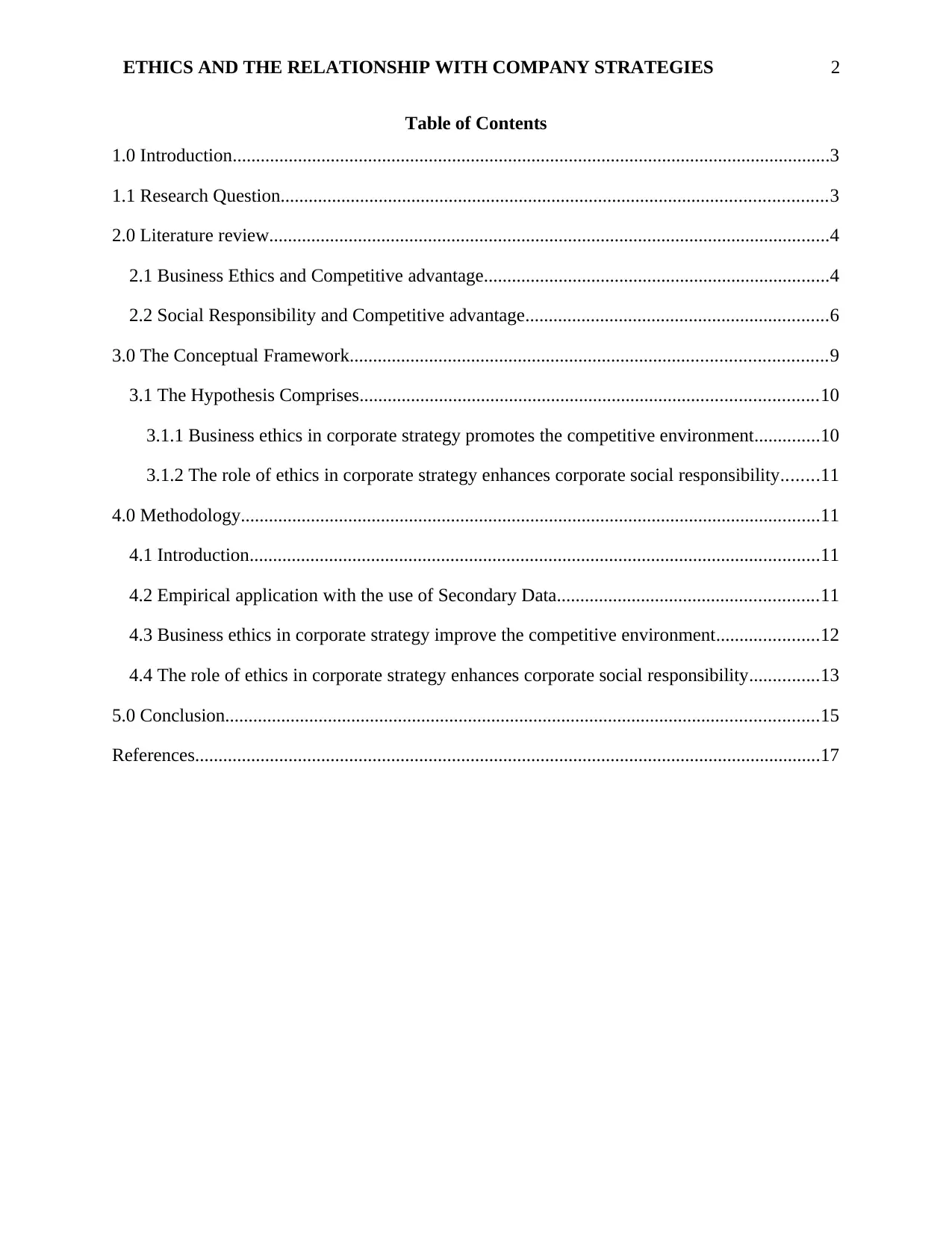
ETHICS AND THE RELATIONSHIP WITH COMPANY STRATEGIES 2
Table of Contents
1.0 Introduction................................................................................................................................3
1.1 Research Question.....................................................................................................................3
2.0 Literature review........................................................................................................................4
2.1 Business Ethics and Competitive advantage..........................................................................4
2.2 Social Responsibility and Competitive advantage.................................................................6
3.0 The Conceptual Framework......................................................................................................9
3.1 The Hypothesis Comprises..................................................................................................10
3.1.1 Business ethics in corporate strategy promotes the competitive environment..............10
3.1.2 The role of ethics in corporate strategy enhances corporate social responsibility........11
4.0 Methodology............................................................................................................................11
4.1 Introduction..........................................................................................................................11
4.2 Empirical application with the use of Secondary Data........................................................11
4.3 Business ethics in corporate strategy improve the competitive environment......................12
4.4 The role of ethics in corporate strategy enhances corporate social responsibility...............13
5.0 Conclusion...............................................................................................................................15
References......................................................................................................................................17
Table of Contents
1.0 Introduction................................................................................................................................3
1.1 Research Question.....................................................................................................................3
2.0 Literature review........................................................................................................................4
2.1 Business Ethics and Competitive advantage..........................................................................4
2.2 Social Responsibility and Competitive advantage.................................................................6
3.0 The Conceptual Framework......................................................................................................9
3.1 The Hypothesis Comprises..................................................................................................10
3.1.1 Business ethics in corporate strategy promotes the competitive environment..............10
3.1.2 The role of ethics in corporate strategy enhances corporate social responsibility........11
4.0 Methodology............................................................................................................................11
4.1 Introduction..........................................................................................................................11
4.2 Empirical application with the use of Secondary Data........................................................11
4.3 Business ethics in corporate strategy improve the competitive environment......................12
4.4 The role of ethics in corporate strategy enhances corporate social responsibility...............13
5.0 Conclusion...............................................................................................................................15
References......................................................................................................................................17
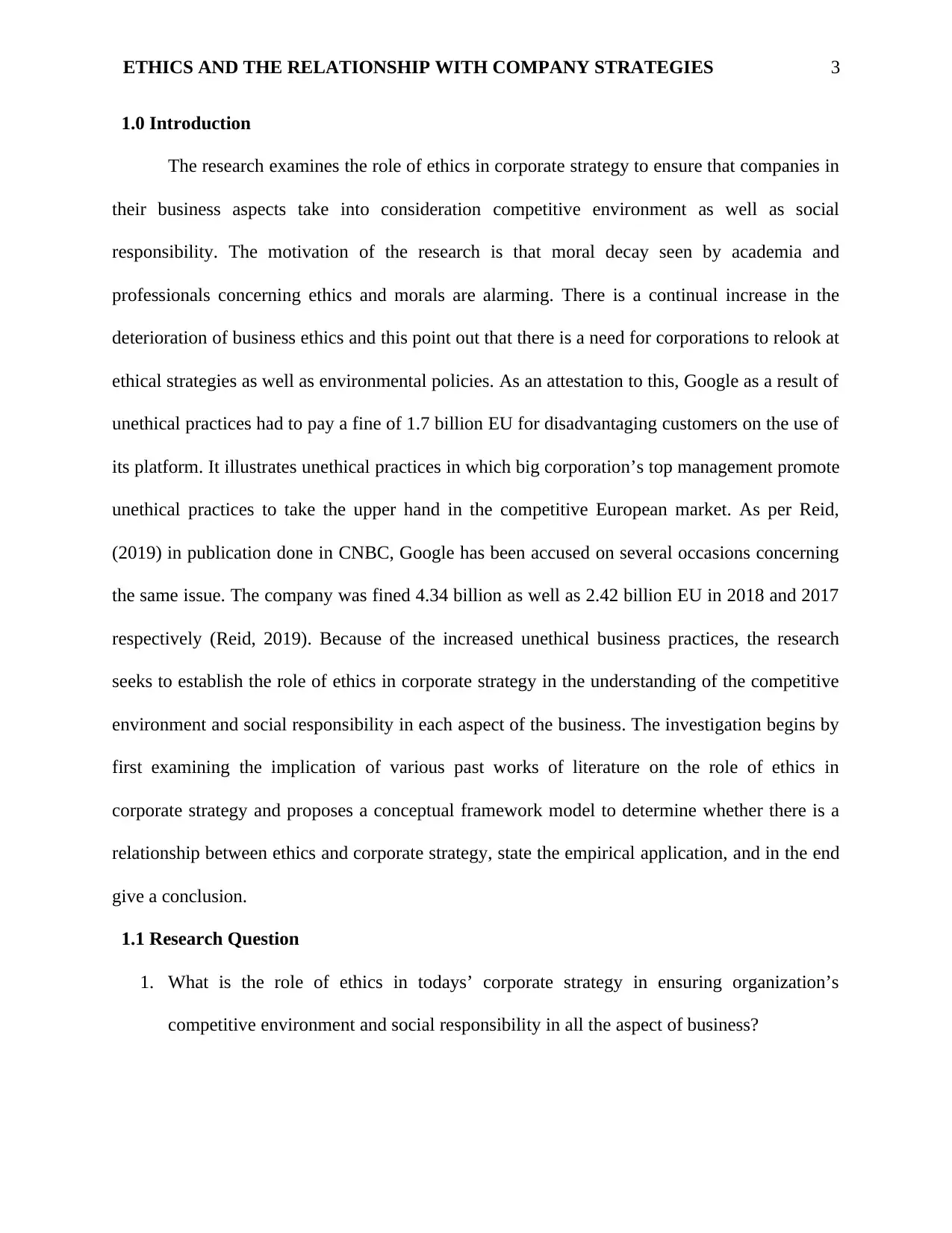
ETHICS AND THE RELATIONSHIP WITH COMPANY STRATEGIES 3
1.0 Introduction
The research examines the role of ethics in corporate strategy to ensure that companies in
their business aspects take into consideration competitive environment as well as social
responsibility. The motivation of the research is that moral decay seen by academia and
professionals concerning ethics and morals are alarming. There is a continual increase in the
deterioration of business ethics and this point out that there is a need for corporations to relook at
ethical strategies as well as environmental policies. As an attestation to this, Google as a result of
unethical practices had to pay a fine of 1.7 billion EU for disadvantaging customers on the use of
its platform. It illustrates unethical practices in which big corporation’s top management promote
unethical practices to take the upper hand in the competitive European market. As per Reid,
(2019) in publication done in CNBC, Google has been accused on several occasions concerning
the same issue. The company was fined 4.34 billion as well as 2.42 billion EU in 2018 and 2017
respectively (Reid, 2019). Because of the increased unethical business practices, the research
seeks to establish the role of ethics in corporate strategy in the understanding of the competitive
environment and social responsibility in each aspect of the business. The investigation begins by
first examining the implication of various past works of literature on the role of ethics in
corporate strategy and proposes a conceptual framework model to determine whether there is a
relationship between ethics and corporate strategy, state the empirical application, and in the end
give a conclusion.
1.1 Research Question
1. What is the role of ethics in todays’ corporate strategy in ensuring organization’s
competitive environment and social responsibility in all the aspect of business?
1.0 Introduction
The research examines the role of ethics in corporate strategy to ensure that companies in
their business aspects take into consideration competitive environment as well as social
responsibility. The motivation of the research is that moral decay seen by academia and
professionals concerning ethics and morals are alarming. There is a continual increase in the
deterioration of business ethics and this point out that there is a need for corporations to relook at
ethical strategies as well as environmental policies. As an attestation to this, Google as a result of
unethical practices had to pay a fine of 1.7 billion EU for disadvantaging customers on the use of
its platform. It illustrates unethical practices in which big corporation’s top management promote
unethical practices to take the upper hand in the competitive European market. As per Reid,
(2019) in publication done in CNBC, Google has been accused on several occasions concerning
the same issue. The company was fined 4.34 billion as well as 2.42 billion EU in 2018 and 2017
respectively (Reid, 2019). Because of the increased unethical business practices, the research
seeks to establish the role of ethics in corporate strategy in the understanding of the competitive
environment and social responsibility in each aspect of the business. The investigation begins by
first examining the implication of various past works of literature on the role of ethics in
corporate strategy and proposes a conceptual framework model to determine whether there is a
relationship between ethics and corporate strategy, state the empirical application, and in the end
give a conclusion.
1.1 Research Question
1. What is the role of ethics in todays’ corporate strategy in ensuring organization’s
competitive environment and social responsibility in all the aspect of business?
⊘ This is a preview!⊘
Do you want full access?
Subscribe today to unlock all pages.

Trusted by 1+ million students worldwide
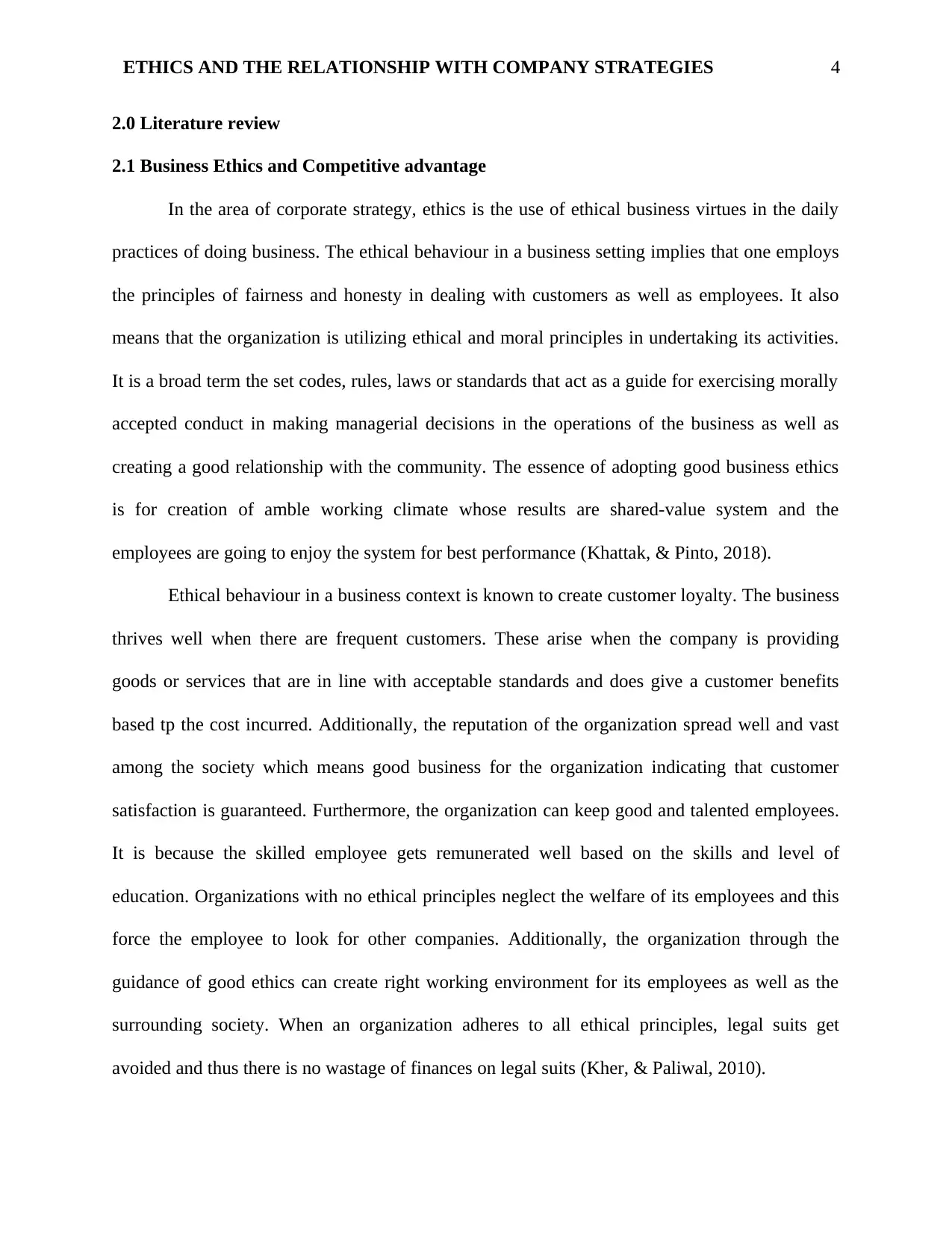
ETHICS AND THE RELATIONSHIP WITH COMPANY STRATEGIES 4
2.0 Literature review
2.1 Business Ethics and Competitive advantage
In the area of corporate strategy, ethics is the use of ethical business virtues in the daily
practices of doing business. The ethical behaviour in a business setting implies that one employs
the principles of fairness and honesty in dealing with customers as well as employees. It also
means that the organization is utilizing ethical and moral principles in undertaking its activities.
It is a broad term the set codes, rules, laws or standards that act as a guide for exercising morally
accepted conduct in making managerial decisions in the operations of the business as well as
creating a good relationship with the community. The essence of adopting good business ethics
is for creation of amble working climate whose results are shared-value system and the
employees are going to enjoy the system for best performance (Khattak, & Pinto, 2018).
Ethical behaviour in a business context is known to create customer loyalty. The business
thrives well when there are frequent customers. These arise when the company is providing
goods or services that are in line with acceptable standards and does give a customer benefits
based tp the cost incurred. Additionally, the reputation of the organization spread well and vast
among the society which means good business for the organization indicating that customer
satisfaction is guaranteed. Furthermore, the organization can keep good and talented employees.
It is because the skilled employee gets remunerated well based on the skills and level of
education. Organizations with no ethical principles neglect the welfare of its employees and this
force the employee to look for other companies. Additionally, the organization through the
guidance of good ethics can create right working environment for its employees as well as the
surrounding society. When an organization adheres to all ethical principles, legal suits get
avoided and thus there is no wastage of finances on legal suits (Kher, & Paliwal, 2010).
2.0 Literature review
2.1 Business Ethics and Competitive advantage
In the area of corporate strategy, ethics is the use of ethical business virtues in the daily
practices of doing business. The ethical behaviour in a business setting implies that one employs
the principles of fairness and honesty in dealing with customers as well as employees. It also
means that the organization is utilizing ethical and moral principles in undertaking its activities.
It is a broad term the set codes, rules, laws or standards that act as a guide for exercising morally
accepted conduct in making managerial decisions in the operations of the business as well as
creating a good relationship with the community. The essence of adopting good business ethics
is for creation of amble working climate whose results are shared-value system and the
employees are going to enjoy the system for best performance (Khattak, & Pinto, 2018).
Ethical behaviour in a business context is known to create customer loyalty. The business
thrives well when there are frequent customers. These arise when the company is providing
goods or services that are in line with acceptable standards and does give a customer benefits
based tp the cost incurred. Additionally, the reputation of the organization spread well and vast
among the society which means good business for the organization indicating that customer
satisfaction is guaranteed. Furthermore, the organization can keep good and talented employees.
It is because the skilled employee gets remunerated well based on the skills and level of
education. Organizations with no ethical principles neglect the welfare of its employees and this
force the employee to look for other companies. Additionally, the organization through the
guidance of good ethics can create right working environment for its employees as well as the
surrounding society. When an organization adheres to all ethical principles, legal suits get
avoided and thus there is no wastage of finances on legal suits (Kher, & Paliwal, 2010).
Paraphrase This Document
Need a fresh take? Get an instant paraphrase of this document with our AI Paraphraser
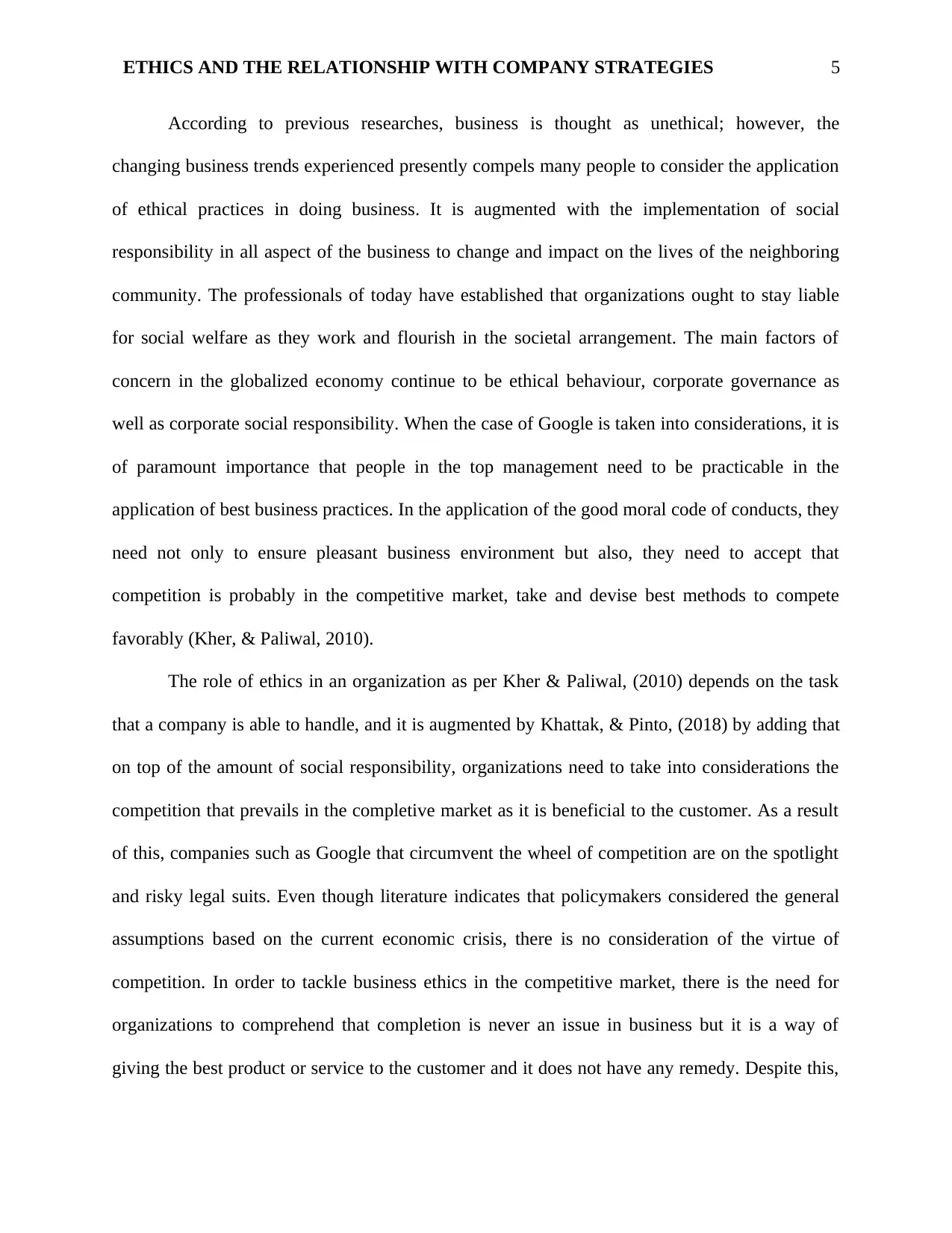
ETHICS AND THE RELATIONSHIP WITH COMPANY STRATEGIES 5
According to previous researches, business is thought as unethical; however, the
changing business trends experienced presently compels many people to consider the application
of ethical practices in doing business. It is augmented with the implementation of social
responsibility in all aspect of the business to change and impact on the lives of the neighboring
community. The professionals of today have established that organizations ought to stay liable
for social welfare as they work and flourish in the societal arrangement. The main factors of
concern in the globalized economy continue to be ethical behaviour, corporate governance as
well as corporate social responsibility. When the case of Google is taken into considerations, it is
of paramount importance that people in the top management need to be practicable in the
application of best business practices. In the application of the good moral code of conducts, they
need not only to ensure pleasant business environment but also, they need to accept that
competition is probably in the competitive market, take and devise best methods to compete
favorably (Kher, & Paliwal, 2010).
The role of ethics in an organization as per Kher & Paliwal, (2010) depends on the task
that a company is able to handle, and it is augmented by Khattak, & Pinto, (2018) by adding that
on top of the amount of social responsibility, organizations need to take into considerations the
competition that prevails in the completive market as it is beneficial to the customer. As a result
of this, companies such as Google that circumvent the wheel of competition are on the spotlight
and risky legal suits. Even though literature indicates that policymakers considered the general
assumptions based on the current economic crisis, there is no consideration of the virtue of
competition. In order to tackle business ethics in the competitive market, there is the need for
organizations to comprehend that completion is never an issue in business but it is a way of
giving the best product or service to the customer and it does not have any remedy. Despite this,
According to previous researches, business is thought as unethical; however, the
changing business trends experienced presently compels many people to consider the application
of ethical practices in doing business. It is augmented with the implementation of social
responsibility in all aspect of the business to change and impact on the lives of the neighboring
community. The professionals of today have established that organizations ought to stay liable
for social welfare as they work and flourish in the societal arrangement. The main factors of
concern in the globalized economy continue to be ethical behaviour, corporate governance as
well as corporate social responsibility. When the case of Google is taken into considerations, it is
of paramount importance that people in the top management need to be practicable in the
application of best business practices. In the application of the good moral code of conducts, they
need not only to ensure pleasant business environment but also, they need to accept that
competition is probably in the competitive market, take and devise best methods to compete
favorably (Kher, & Paliwal, 2010).
The role of ethics in an organization as per Kher & Paliwal, (2010) depends on the task
that a company is able to handle, and it is augmented by Khattak, & Pinto, (2018) by adding that
on top of the amount of social responsibility, organizations need to take into considerations the
competition that prevails in the completive market as it is beneficial to the customer. As a result
of this, companies such as Google that circumvent the wheel of competition are on the spotlight
and risky legal suits. Even though literature indicates that policymakers considered the general
assumptions based on the current economic crisis, there is no consideration of the virtue of
competition. In order to tackle business ethics in the competitive market, there is the need for
organizations to comprehend that completion is never an issue in business but it is a way of
giving the best product or service to the customer and it does not have any remedy. Despite this,
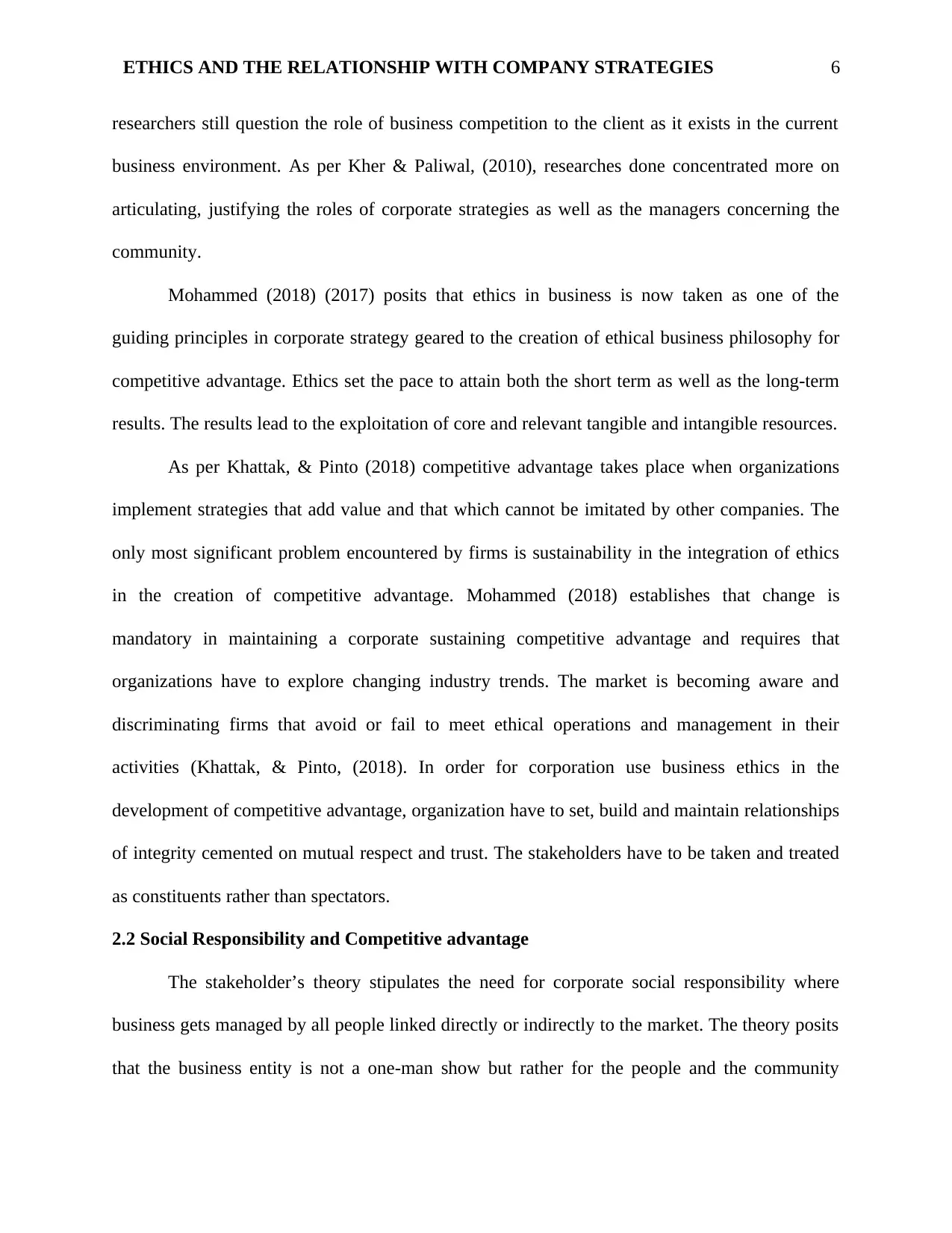
ETHICS AND THE RELATIONSHIP WITH COMPANY STRATEGIES 6
researchers still question the role of business competition to the client as it exists in the current
business environment. As per Kher & Paliwal, (2010), researches done concentrated more on
articulating, justifying the roles of corporate strategies as well as the managers concerning the
community.
Mohammed (2018) (2017) posits that ethics in business is now taken as one of the
guiding principles in corporate strategy geared to the creation of ethical business philosophy for
competitive advantage. Ethics set the pace to attain both the short term as well as the long-term
results. The results lead to the exploitation of core and relevant tangible and intangible resources.
As per Khattak, & Pinto (2018) competitive advantage takes place when organizations
implement strategies that add value and that which cannot be imitated by other companies. The
only most significant problem encountered by firms is sustainability in the integration of ethics
in the creation of competitive advantage. Mohammed (2018) establishes that change is
mandatory in maintaining a corporate sustaining competitive advantage and requires that
organizations have to explore changing industry trends. The market is becoming aware and
discriminating firms that avoid or fail to meet ethical operations and management in their
activities (Khattak, & Pinto, (2018). In order for corporation use business ethics in the
development of competitive advantage, organization have to set, build and maintain relationships
of integrity cemented on mutual respect and trust. The stakeholders have to be taken and treated
as constituents rather than spectators.
2.2 Social Responsibility and Competitive advantage
The stakeholder’s theory stipulates the need for corporate social responsibility where
business gets managed by all people linked directly or indirectly to the market. The theory posits
that the business entity is not a one-man show but rather for the people and the community
researchers still question the role of business competition to the client as it exists in the current
business environment. As per Kher & Paliwal, (2010), researches done concentrated more on
articulating, justifying the roles of corporate strategies as well as the managers concerning the
community.
Mohammed (2018) (2017) posits that ethics in business is now taken as one of the
guiding principles in corporate strategy geared to the creation of ethical business philosophy for
competitive advantage. Ethics set the pace to attain both the short term as well as the long-term
results. The results lead to the exploitation of core and relevant tangible and intangible resources.
As per Khattak, & Pinto (2018) competitive advantage takes place when organizations
implement strategies that add value and that which cannot be imitated by other companies. The
only most significant problem encountered by firms is sustainability in the integration of ethics
in the creation of competitive advantage. Mohammed (2018) establishes that change is
mandatory in maintaining a corporate sustaining competitive advantage and requires that
organizations have to explore changing industry trends. The market is becoming aware and
discriminating firms that avoid or fail to meet ethical operations and management in their
activities (Khattak, & Pinto, (2018). In order for corporation use business ethics in the
development of competitive advantage, organization have to set, build and maintain relationships
of integrity cemented on mutual respect and trust. The stakeholders have to be taken and treated
as constituents rather than spectators.
2.2 Social Responsibility and Competitive advantage
The stakeholder’s theory stipulates the need for corporate social responsibility where
business gets managed by all people linked directly or indirectly to the market. The theory posits
that the business entity is not a one-man show but rather for the people and the community
⊘ This is a preview!⊘
Do you want full access?
Subscribe today to unlock all pages.

Trusted by 1+ million students worldwide
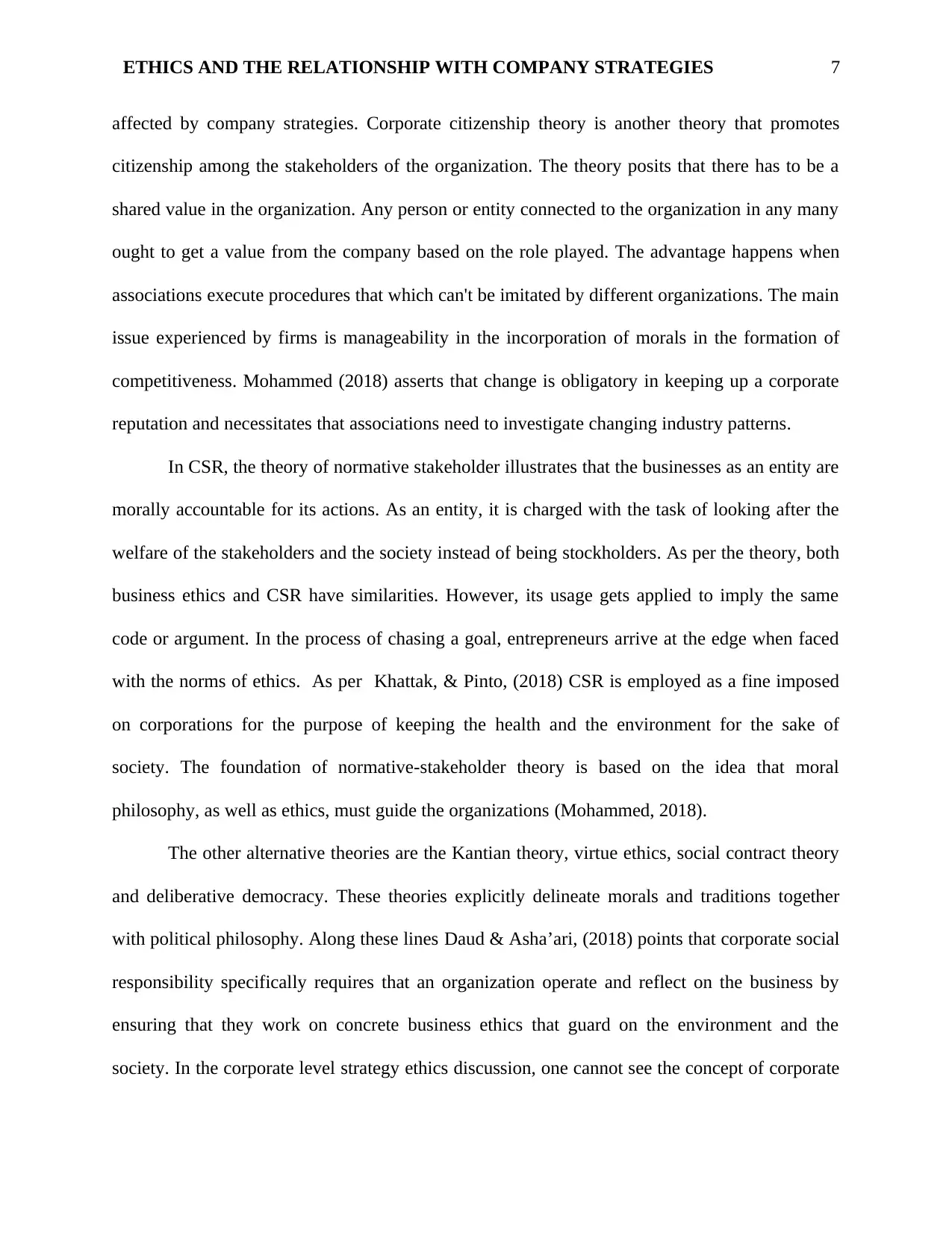
ETHICS AND THE RELATIONSHIP WITH COMPANY STRATEGIES 7
affected by company strategies. Corporate citizenship theory is another theory that promotes
citizenship among the stakeholders of the organization. The theory posits that there has to be a
shared value in the organization. Any person or entity connected to the organization in any many
ought to get a value from the company based on the role played. The advantage happens when
associations execute procedures that which can't be imitated by different organizations. The main
issue experienced by firms is manageability in the incorporation of morals in the formation of
competitiveness. Mohammed (2018) asserts that change is obligatory in keeping up a corporate
reputation and necessitates that associations need to investigate changing industry patterns.
In CSR, the theory of normative stakeholder illustrates that the businesses as an entity are
morally accountable for its actions. As an entity, it is charged with the task of looking after the
welfare of the stakeholders and the society instead of being stockholders. As per the theory, both
business ethics and CSR have similarities. However, its usage gets applied to imply the same
code or argument. In the process of chasing a goal, entrepreneurs arrive at the edge when faced
with the norms of ethics. As per Khattak, & Pinto, (2018) CSR is employed as a fine imposed
on corporations for the purpose of keeping the health and the environment for the sake of
society. The foundation of normative-stakeholder theory is based on the idea that moral
philosophy, as well as ethics, must guide the organizations (Mohammed, 2018).
The other alternative theories are the Kantian theory, virtue ethics, social contract theory
and deliberative democracy. These theories explicitly delineate morals and traditions together
with political philosophy. Along these lines Daud & Asha’ari, (2018) points that corporate social
responsibility specifically requires that an organization operate and reflect on the business by
ensuring that they work on concrete business ethics that guard on the environment and the
society. In the corporate level strategy ethics discussion, one cannot see the concept of corporate
affected by company strategies. Corporate citizenship theory is another theory that promotes
citizenship among the stakeholders of the organization. The theory posits that there has to be a
shared value in the organization. Any person or entity connected to the organization in any many
ought to get a value from the company based on the role played. The advantage happens when
associations execute procedures that which can't be imitated by different organizations. The main
issue experienced by firms is manageability in the incorporation of morals in the formation of
competitiveness. Mohammed (2018) asserts that change is obligatory in keeping up a corporate
reputation and necessitates that associations need to investigate changing industry patterns.
In CSR, the theory of normative stakeholder illustrates that the businesses as an entity are
morally accountable for its actions. As an entity, it is charged with the task of looking after the
welfare of the stakeholders and the society instead of being stockholders. As per the theory, both
business ethics and CSR have similarities. However, its usage gets applied to imply the same
code or argument. In the process of chasing a goal, entrepreneurs arrive at the edge when faced
with the norms of ethics. As per Khattak, & Pinto, (2018) CSR is employed as a fine imposed
on corporations for the purpose of keeping the health and the environment for the sake of
society. The foundation of normative-stakeholder theory is based on the idea that moral
philosophy, as well as ethics, must guide the organizations (Mohammed, 2018).
The other alternative theories are the Kantian theory, virtue ethics, social contract theory
and deliberative democracy. These theories explicitly delineate morals and traditions together
with political philosophy. Along these lines Daud & Asha’ari, (2018) points that corporate social
responsibility specifically requires that an organization operate and reflect on the business by
ensuring that they work on concrete business ethics that guard on the environment and the
society. In the corporate level strategy ethics discussion, one cannot see the concept of corporate
Paraphrase This Document
Need a fresh take? Get an instant paraphrase of this document with our AI Paraphraser
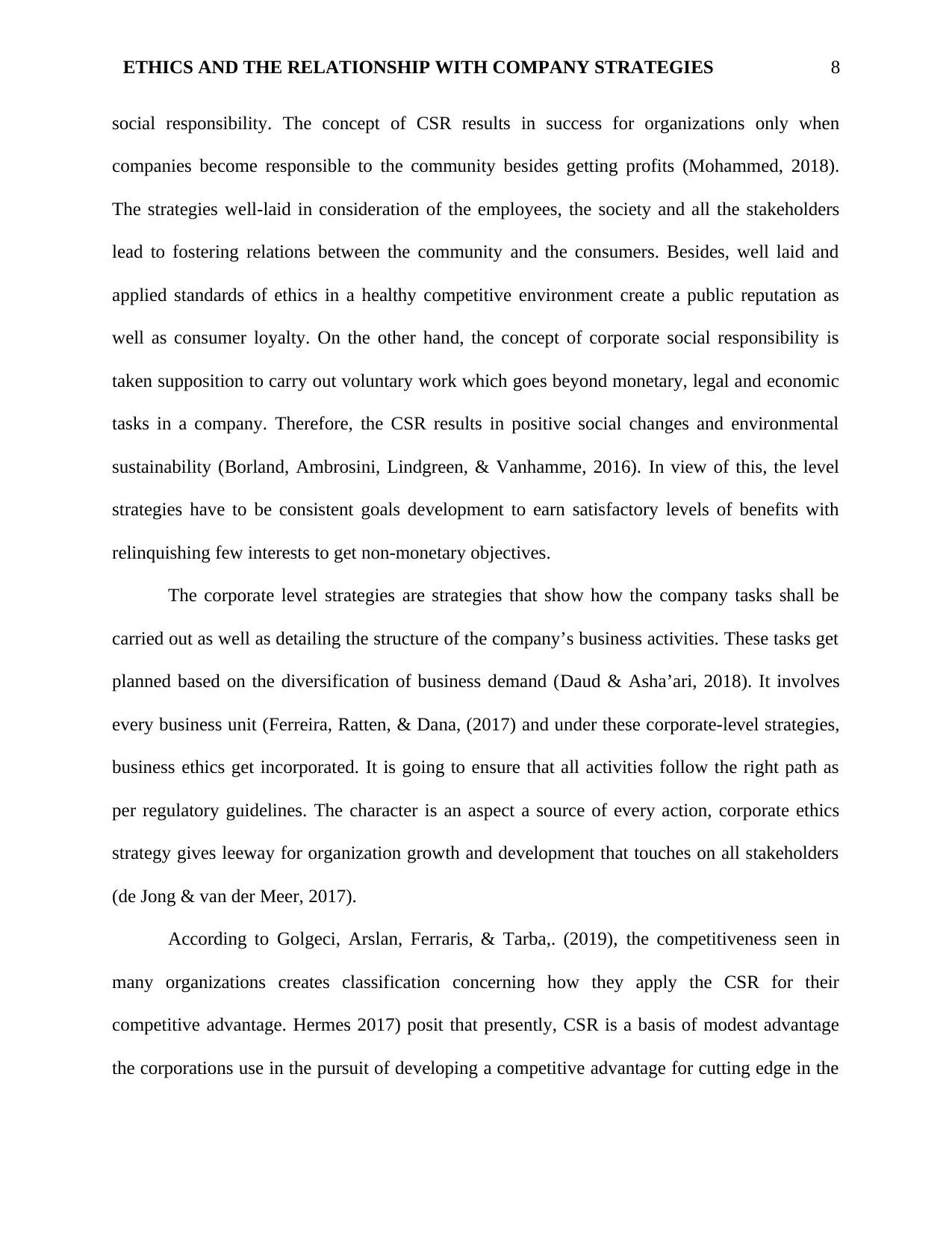
ETHICS AND THE RELATIONSHIP WITH COMPANY STRATEGIES 8
social responsibility. The concept of CSR results in success for organizations only when
companies become responsible to the community besides getting profits (Mohammed, 2018).
The strategies well-laid in consideration of the employees, the society and all the stakeholders
lead to fostering relations between the community and the consumers. Besides, well laid and
applied standards of ethics in a healthy competitive environment create a public reputation as
well as consumer loyalty. On the other hand, the concept of corporate social responsibility is
taken supposition to carry out voluntary work which goes beyond monetary, legal and economic
tasks in a company. Therefore, the CSR results in positive social changes and environmental
sustainability (Borland, Ambrosini, Lindgreen, & Vanhamme, 2016). In view of this, the level
strategies have to be consistent goals development to earn satisfactory levels of benefits with
relinquishing few interests to get non-monetary objectives.
The corporate level strategies are strategies that show how the company tasks shall be
carried out as well as detailing the structure of the company’s business activities. These tasks get
planned based on the diversification of business demand (Daud & Asha’ari, 2018). It involves
every business unit (Ferreira, Ratten, & Dana, (2017) and under these corporate-level strategies,
business ethics get incorporated. It is going to ensure that all activities follow the right path as
per regulatory guidelines. The character is an aspect a source of every action, corporate ethics
strategy gives leeway for organization growth and development that touches on all stakeholders
(de Jong & van der Meer, 2017).
According to Golgeci, Arslan, Ferraris, & Tarba,. (2019), the competitiveness seen in
many organizations creates classification concerning how they apply the CSR for their
competitive advantage. Hermes 2017) posit that presently, CSR is a basis of modest advantage
the corporations use in the pursuit of developing a competitive advantage for cutting edge in the
social responsibility. The concept of CSR results in success for organizations only when
companies become responsible to the community besides getting profits (Mohammed, 2018).
The strategies well-laid in consideration of the employees, the society and all the stakeholders
lead to fostering relations between the community and the consumers. Besides, well laid and
applied standards of ethics in a healthy competitive environment create a public reputation as
well as consumer loyalty. On the other hand, the concept of corporate social responsibility is
taken supposition to carry out voluntary work which goes beyond monetary, legal and economic
tasks in a company. Therefore, the CSR results in positive social changes and environmental
sustainability (Borland, Ambrosini, Lindgreen, & Vanhamme, 2016). In view of this, the level
strategies have to be consistent goals development to earn satisfactory levels of benefits with
relinquishing few interests to get non-monetary objectives.
The corporate level strategies are strategies that show how the company tasks shall be
carried out as well as detailing the structure of the company’s business activities. These tasks get
planned based on the diversification of business demand (Daud & Asha’ari, 2018). It involves
every business unit (Ferreira, Ratten, & Dana, (2017) and under these corporate-level strategies,
business ethics get incorporated. It is going to ensure that all activities follow the right path as
per regulatory guidelines. The character is an aspect a source of every action, corporate ethics
strategy gives leeway for organization growth and development that touches on all stakeholders
(de Jong & van der Meer, 2017).
According to Golgeci, Arslan, Ferraris, & Tarba,. (2019), the competitiveness seen in
many organizations creates classification concerning how they apply the CSR for their
competitive advantage. Hermes 2017) posit that presently, CSR is a basis of modest advantage
the corporations use in the pursuit of developing a competitive advantage for cutting edge in the
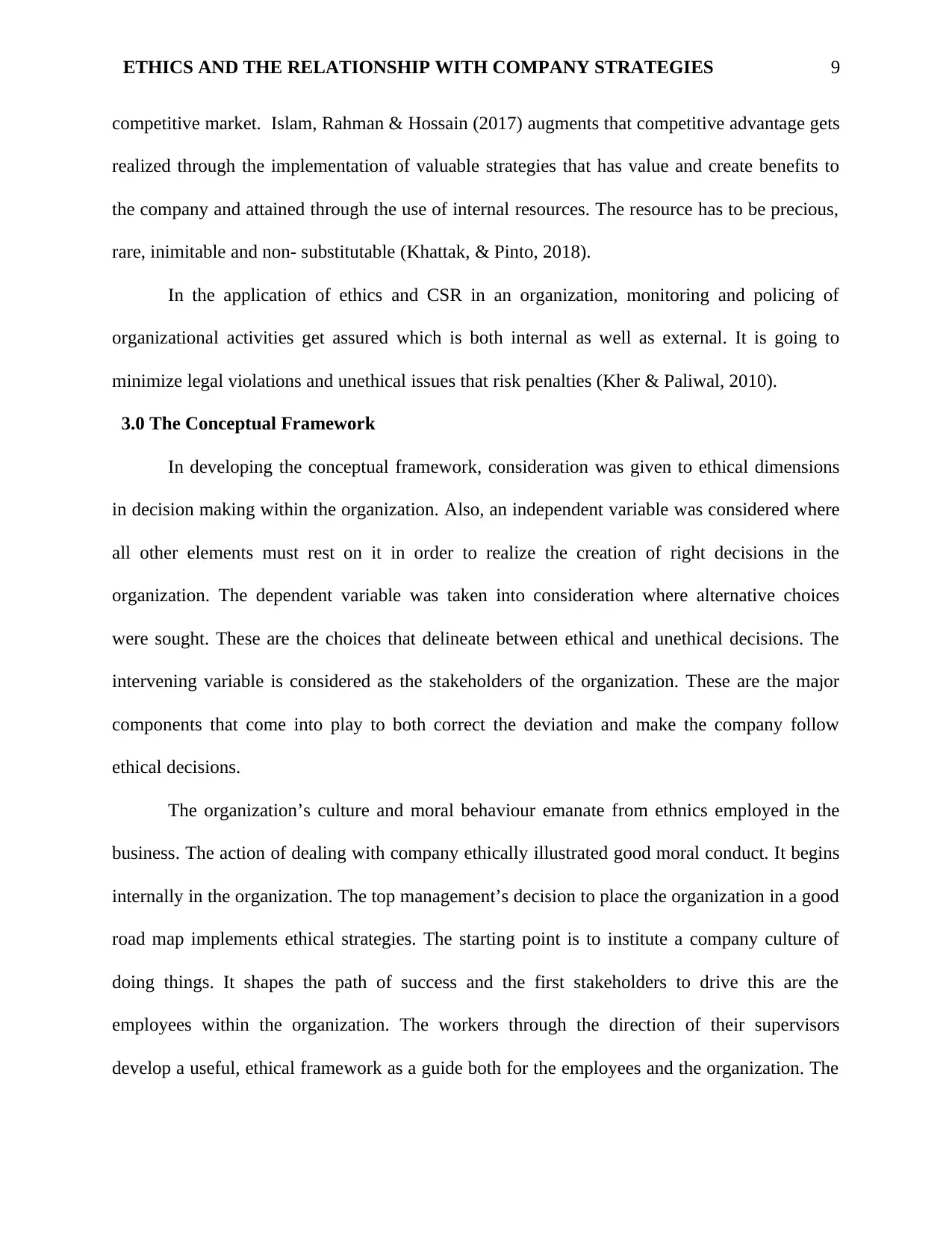
ETHICS AND THE RELATIONSHIP WITH COMPANY STRATEGIES 9
competitive market. Islam, Rahman & Hossain (2017) augments that competitive advantage gets
realized through the implementation of valuable strategies that has value and create benefits to
the company and attained through the use of internal resources. The resource has to be precious,
rare, inimitable and non- substitutable (Khattak, & Pinto, 2018).
In the application of ethics and CSR in an organization, monitoring and policing of
organizational activities get assured which is both internal as well as external. It is going to
minimize legal violations and unethical issues that risk penalties (Kher & Paliwal, 2010).
3.0 The Conceptual Framework
In developing the conceptual framework, consideration was given to ethical dimensions
in decision making within the organization. Also, an independent variable was considered where
all other elements must rest on it in order to realize the creation of right decisions in the
organization. The dependent variable was taken into consideration where alternative choices
were sought. These are the choices that delineate between ethical and unethical decisions. The
intervening variable is considered as the stakeholders of the organization. These are the major
components that come into play to both correct the deviation and make the company follow
ethical decisions.
The organization’s culture and moral behaviour emanate from ethnics employed in the
business. The action of dealing with company ethically illustrated good moral conduct. It begins
internally in the organization. The top management’s decision to place the organization in a good
road map implements ethical strategies. The starting point is to institute a company culture of
doing things. It shapes the path of success and the first stakeholders to drive this are the
employees within the organization. The workers through the direction of their supervisors
develop a useful, ethical framework as a guide both for the employees and the organization. The
competitive market. Islam, Rahman & Hossain (2017) augments that competitive advantage gets
realized through the implementation of valuable strategies that has value and create benefits to
the company and attained through the use of internal resources. The resource has to be precious,
rare, inimitable and non- substitutable (Khattak, & Pinto, 2018).
In the application of ethics and CSR in an organization, monitoring and policing of
organizational activities get assured which is both internal as well as external. It is going to
minimize legal violations and unethical issues that risk penalties (Kher & Paliwal, 2010).
3.0 The Conceptual Framework
In developing the conceptual framework, consideration was given to ethical dimensions
in decision making within the organization. Also, an independent variable was considered where
all other elements must rest on it in order to realize the creation of right decisions in the
organization. The dependent variable was taken into consideration where alternative choices
were sought. These are the choices that delineate between ethical and unethical decisions. The
intervening variable is considered as the stakeholders of the organization. These are the major
components that come into play to both correct the deviation and make the company follow
ethical decisions.
The organization’s culture and moral behaviour emanate from ethnics employed in the
business. The action of dealing with company ethically illustrated good moral conduct. It begins
internally in the organization. The top management’s decision to place the organization in a good
road map implements ethical strategies. The starting point is to institute a company culture of
doing things. It shapes the path of success and the first stakeholders to drive this are the
employees within the organization. The workers through the direction of their supervisors
develop a useful, ethical framework as a guide both for the employees and the organization. The
⊘ This is a preview!⊘
Do you want full access?
Subscribe today to unlock all pages.

Trusted by 1+ million students worldwide
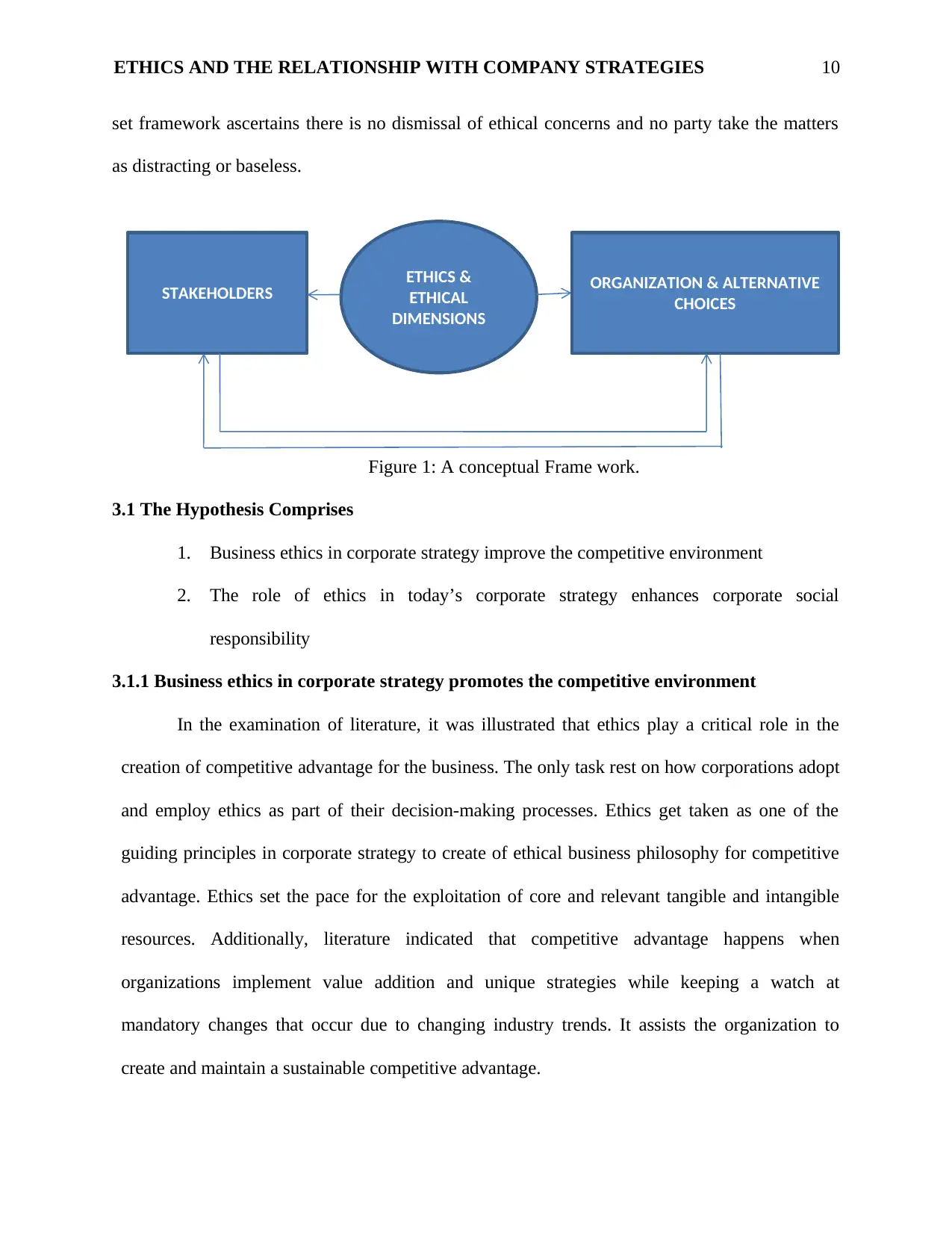
ETHICS AND THE RELATIONSHIP WITH COMPANY STRATEGIES 10
set framework ascertains there is no dismissal of ethical concerns and no party take the matters
as distracting or baseless.
Figure 1: A conceptual Frame work.
3.1 The Hypothesis Comprises
1. Business ethics in corporate strategy improve the competitive environment
2. The role of ethics in today’s corporate strategy enhances corporate social
responsibility
3.1.1 Business ethics in corporate strategy promotes the competitive environment
In the examination of literature, it was illustrated that ethics play a critical role in the
creation of competitive advantage for the business. The only task rest on how corporations adopt
and employ ethics as part of their decision-making processes. Ethics get taken as one of the
guiding principles in corporate strategy to create of ethical business philosophy for competitive
advantage. Ethics set the pace for the exploitation of core and relevant tangible and intangible
resources. Additionally, literature indicated that competitive advantage happens when
organizations implement value addition and unique strategies while keeping a watch at
mandatory changes that occur due to changing industry trends. It assists the organization to
create and maintain a sustainable competitive advantage.
STAKEHOLDERS ORGANIZATION & ALTERNATIVE
CHOICES
ETHICS &
ETHICAL
DIMENSIONS
set framework ascertains there is no dismissal of ethical concerns and no party take the matters
as distracting or baseless.
Figure 1: A conceptual Frame work.
3.1 The Hypothesis Comprises
1. Business ethics in corporate strategy improve the competitive environment
2. The role of ethics in today’s corporate strategy enhances corporate social
responsibility
3.1.1 Business ethics in corporate strategy promotes the competitive environment
In the examination of literature, it was illustrated that ethics play a critical role in the
creation of competitive advantage for the business. The only task rest on how corporations adopt
and employ ethics as part of their decision-making processes. Ethics get taken as one of the
guiding principles in corporate strategy to create of ethical business philosophy for competitive
advantage. Ethics set the pace for the exploitation of core and relevant tangible and intangible
resources. Additionally, literature indicated that competitive advantage happens when
organizations implement value addition and unique strategies while keeping a watch at
mandatory changes that occur due to changing industry trends. It assists the organization to
create and maintain a sustainable competitive advantage.
STAKEHOLDERS ORGANIZATION & ALTERNATIVE
CHOICES
ETHICS &
ETHICAL
DIMENSIONS
Paraphrase This Document
Need a fresh take? Get an instant paraphrase of this document with our AI Paraphraser
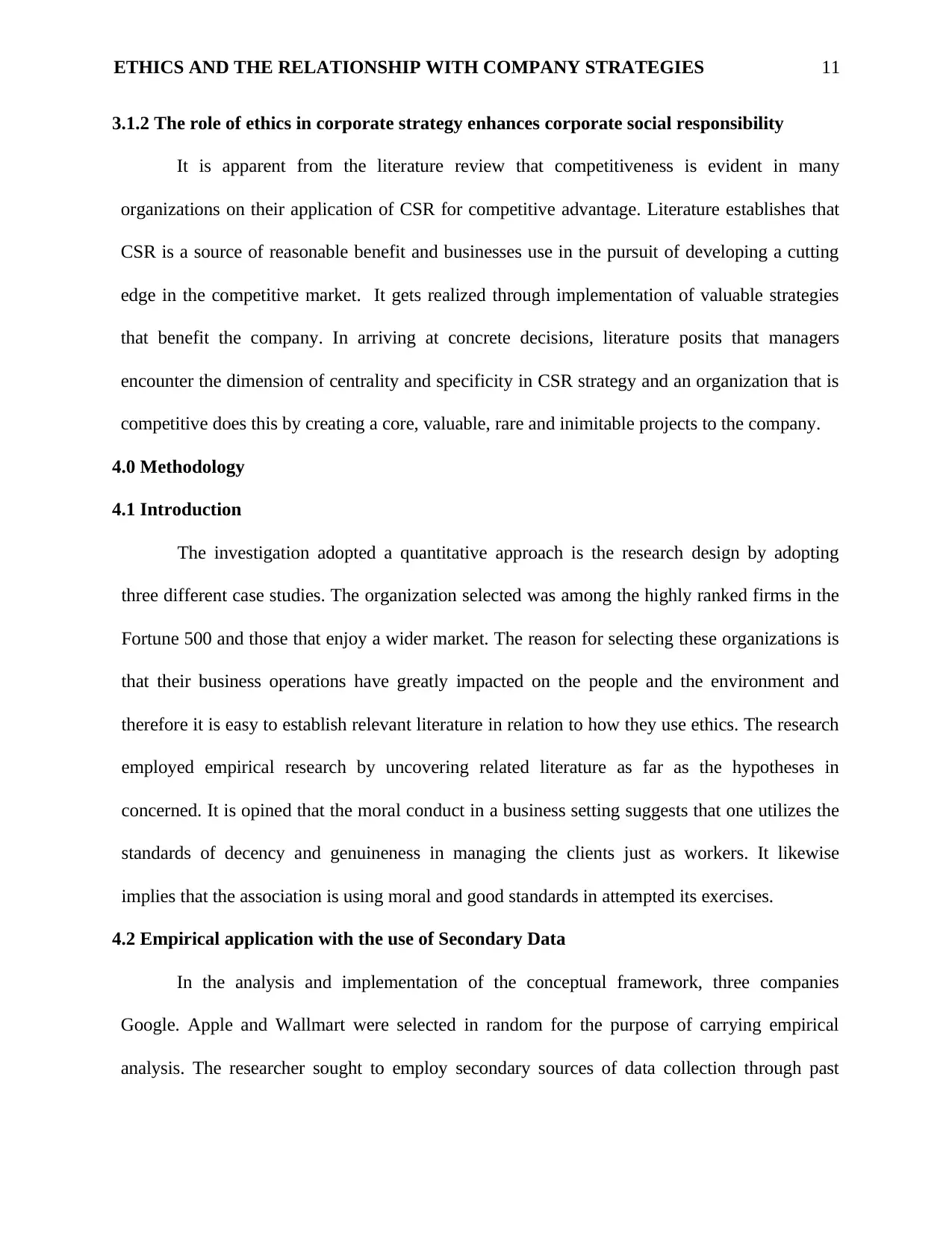
ETHICS AND THE RELATIONSHIP WITH COMPANY STRATEGIES 11
3.1.2 The role of ethics in corporate strategy enhances corporate social responsibility
It is apparent from the literature review that competitiveness is evident in many
organizations on their application of CSR for competitive advantage. Literature establishes that
CSR is a source of reasonable benefit and businesses use in the pursuit of developing a cutting
edge in the competitive market. It gets realized through implementation of valuable strategies
that benefit the company. In arriving at concrete decisions, literature posits that managers
encounter the dimension of centrality and specificity in CSR strategy and an organization that is
competitive does this by creating a core, valuable, rare and inimitable projects to the company.
4.0 Methodology
4.1 Introduction
The investigation adopted a quantitative approach is the research design by adopting
three different case studies. The organization selected was among the highly ranked firms in the
Fortune 500 and those that enjoy a wider market. The reason for selecting these organizations is
that their business operations have greatly impacted on the people and the environment and
therefore it is easy to establish relevant literature in relation to how they use ethics. The research
employed empirical research by uncovering related literature as far as the hypotheses in
concerned. It is opined that the moral conduct in a business setting suggests that one utilizes the
standards of decency and genuineness in managing the clients just as workers. It likewise
implies that the association is using moral and good standards in attempted its exercises.
4.2 Empirical application with the use of Secondary Data
In the analysis and implementation of the conceptual framework, three companies
Google. Apple and Wallmart were selected in random for the purpose of carrying empirical
analysis. The researcher sought to employ secondary sources of data collection through past
3.1.2 The role of ethics in corporate strategy enhances corporate social responsibility
It is apparent from the literature review that competitiveness is evident in many
organizations on their application of CSR for competitive advantage. Literature establishes that
CSR is a source of reasonable benefit and businesses use in the pursuit of developing a cutting
edge in the competitive market. It gets realized through implementation of valuable strategies
that benefit the company. In arriving at concrete decisions, literature posits that managers
encounter the dimension of centrality and specificity in CSR strategy and an organization that is
competitive does this by creating a core, valuable, rare and inimitable projects to the company.
4.0 Methodology
4.1 Introduction
The investigation adopted a quantitative approach is the research design by adopting
three different case studies. The organization selected was among the highly ranked firms in the
Fortune 500 and those that enjoy a wider market. The reason for selecting these organizations is
that their business operations have greatly impacted on the people and the environment and
therefore it is easy to establish relevant literature in relation to how they use ethics. The research
employed empirical research by uncovering related literature as far as the hypotheses in
concerned. It is opined that the moral conduct in a business setting suggests that one utilizes the
standards of decency and genuineness in managing the clients just as workers. It likewise
implies that the association is using moral and good standards in attempted its exercises.
4.2 Empirical application with the use of Secondary Data
In the analysis and implementation of the conceptual framework, three companies
Google. Apple and Wallmart were selected in random for the purpose of carrying empirical
analysis. The researcher sought to employ secondary sources of data collection through past
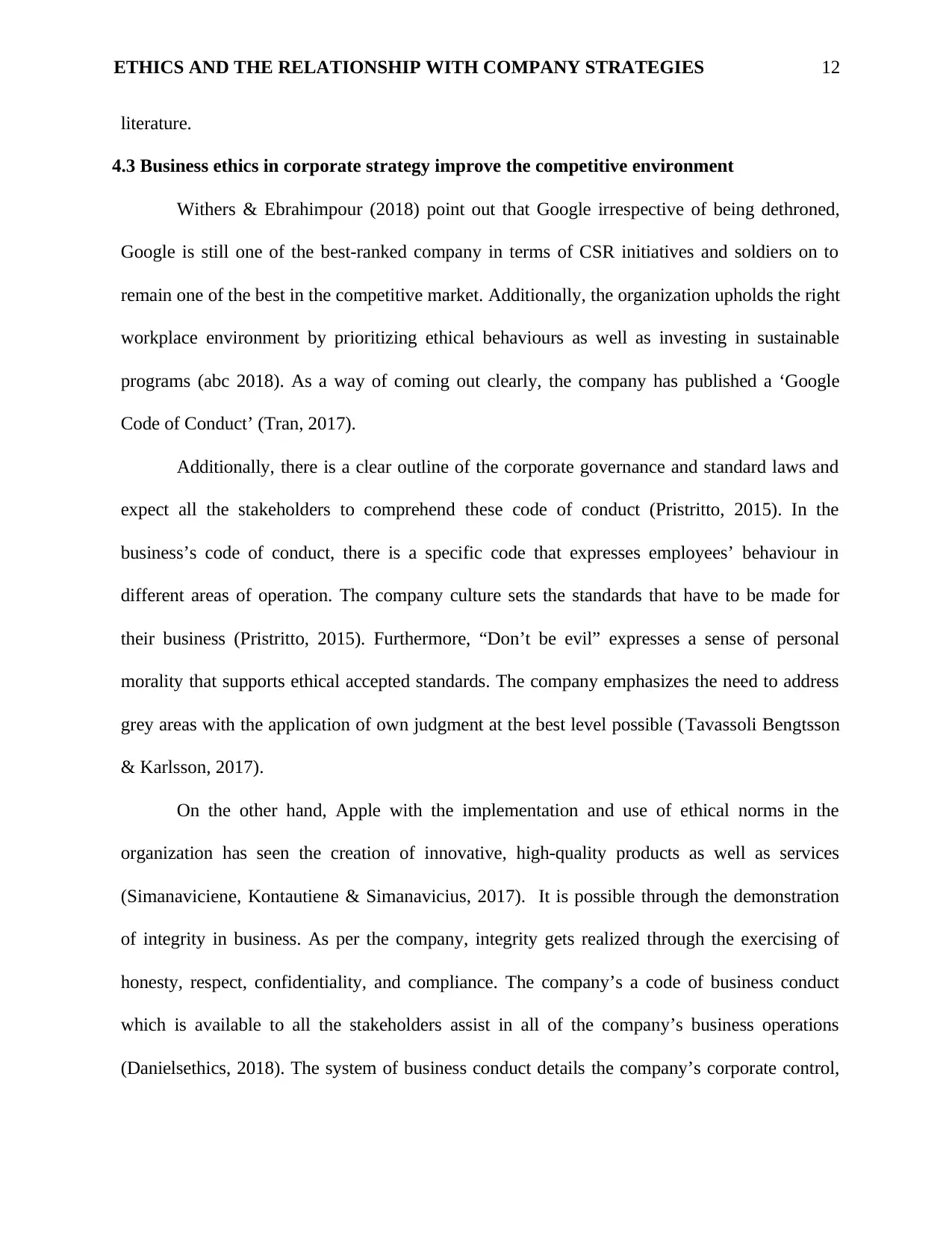
ETHICS AND THE RELATIONSHIP WITH COMPANY STRATEGIES 12
literature.
4.3 Business ethics in corporate strategy improve the competitive environment
Withers & Ebrahimpour (2018) point out that Google irrespective of being dethroned,
Google is still one of the best-ranked company in terms of CSR initiatives and soldiers on to
remain one of the best in the competitive market. Additionally, the organization upholds the right
workplace environment by prioritizing ethical behaviours as well as investing in sustainable
programs (abc 2018). As a way of coming out clearly, the company has published a ‘Google
Code of Conduct’ (Tran, 2017).
Additionally, there is a clear outline of the corporate governance and standard laws and
expect all the stakeholders to comprehend these code of conduct (Pristritto, 2015). In the
business’s code of conduct, there is a specific code that expresses employees’ behaviour in
different areas of operation. The company culture sets the standards that have to be made for
their business (Pristritto, 2015). Furthermore, “Don’t be evil” expresses a sense of personal
morality that supports ethical accepted standards. The company emphasizes the need to address
grey areas with the application of own judgment at the best level possible (Tavassoli Bengtsson
& Karlsson, 2017).
On the other hand, Apple with the implementation and use of ethical norms in the
organization has seen the creation of innovative, high-quality products as well as services
(Simanaviciene, Kontautiene & Simanavicius, 2017). It is possible through the demonstration
of integrity in business. As per the company, integrity gets realized through the exercising of
honesty, respect, confidentiality, and compliance. The company’s a code of business conduct
which is available to all the stakeholders assist in all of the company’s business operations
(Danielsethics, 2018). The system of business conduct details the company’s corporate control,
literature.
4.3 Business ethics in corporate strategy improve the competitive environment
Withers & Ebrahimpour (2018) point out that Google irrespective of being dethroned,
Google is still one of the best-ranked company in terms of CSR initiatives and soldiers on to
remain one of the best in the competitive market. Additionally, the organization upholds the right
workplace environment by prioritizing ethical behaviours as well as investing in sustainable
programs (abc 2018). As a way of coming out clearly, the company has published a ‘Google
Code of Conduct’ (Tran, 2017).
Additionally, there is a clear outline of the corporate governance and standard laws and
expect all the stakeholders to comprehend these code of conduct (Pristritto, 2015). In the
business’s code of conduct, there is a specific code that expresses employees’ behaviour in
different areas of operation. The company culture sets the standards that have to be made for
their business (Pristritto, 2015). Furthermore, “Don’t be evil” expresses a sense of personal
morality that supports ethical accepted standards. The company emphasizes the need to address
grey areas with the application of own judgment at the best level possible (Tavassoli Bengtsson
& Karlsson, 2017).
On the other hand, Apple with the implementation and use of ethical norms in the
organization has seen the creation of innovative, high-quality products as well as services
(Simanaviciene, Kontautiene & Simanavicius, 2017). It is possible through the demonstration
of integrity in business. As per the company, integrity gets realized through the exercising of
honesty, respect, confidentiality, and compliance. The company’s a code of business conduct
which is available to all the stakeholders assist in all of the company’s business operations
(Danielsethics, 2018). The system of business conduct details the company’s corporate control,
⊘ This is a preview!⊘
Do you want full access?
Subscribe today to unlock all pages.

Trusted by 1+ million students worldwide
1 out of 21
Related Documents
Your All-in-One AI-Powered Toolkit for Academic Success.
+13062052269
info@desklib.com
Available 24*7 on WhatsApp / Email
![[object Object]](/_next/static/media/star-bottom.7253800d.svg)
Unlock your academic potential
Copyright © 2020–2025 A2Z Services. All Rights Reserved. Developed and managed by ZUCOL.





